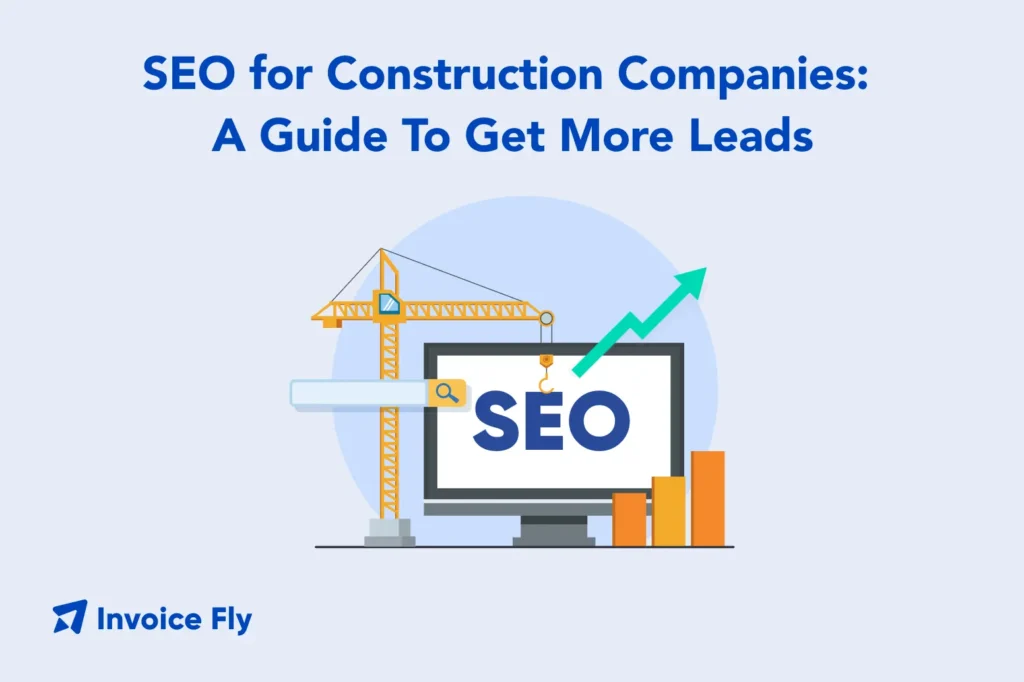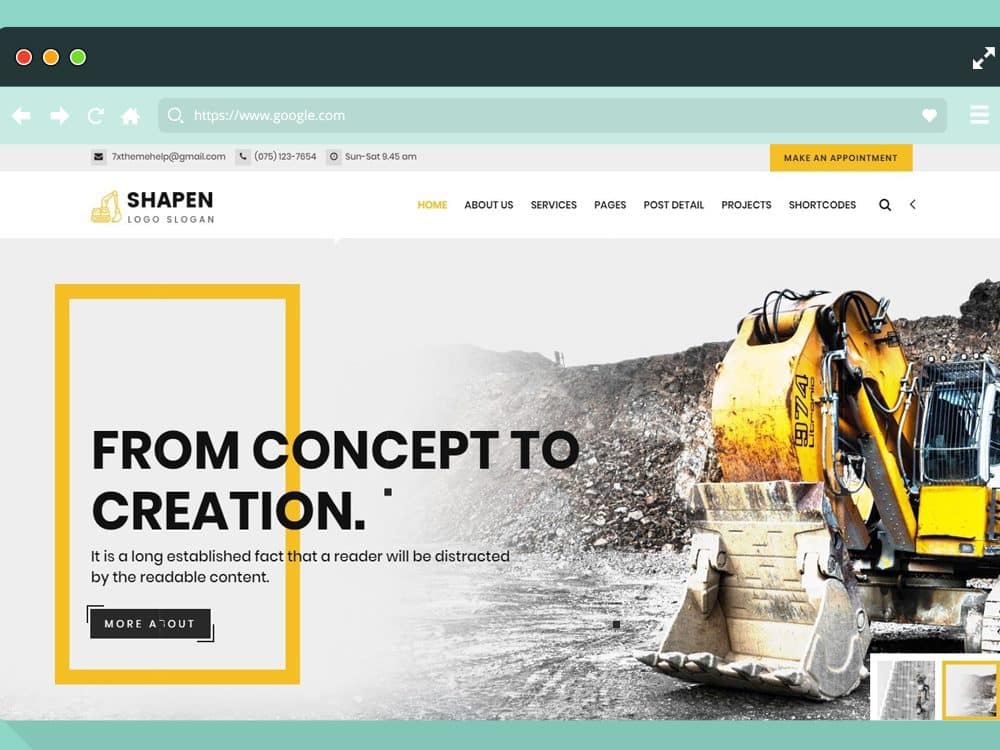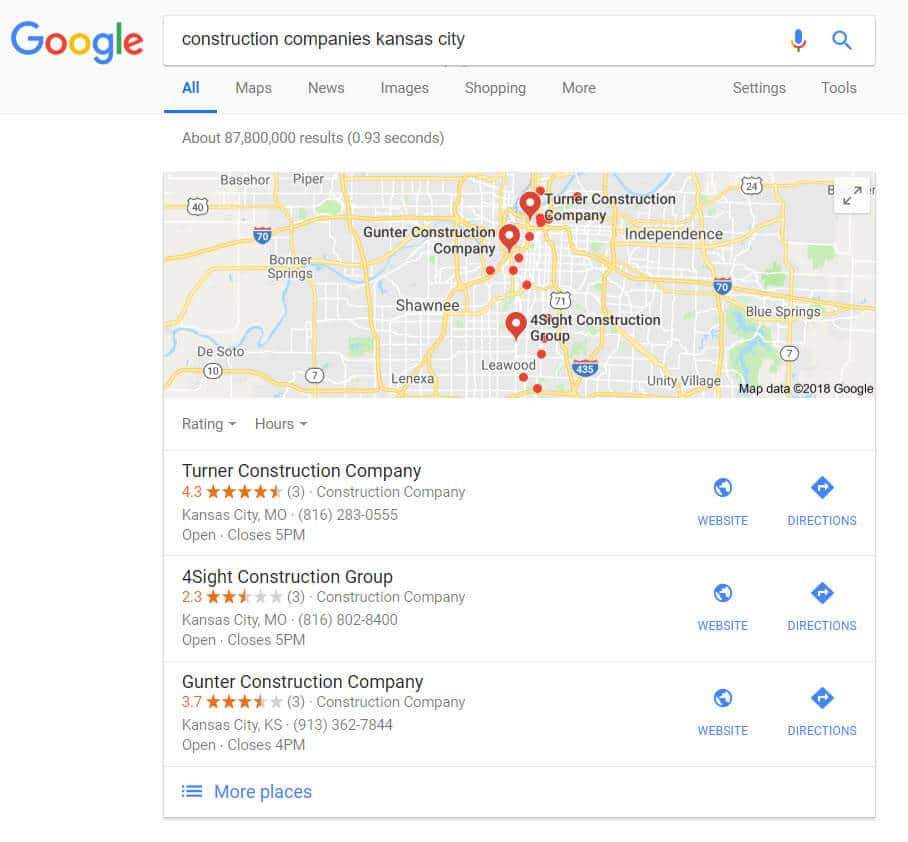SEO for Construction Companies: A Guide To Get More Leads

Table of Contents
- What is SEO for Construction Companies?
- Why is SEO important for Construction Companies?
- An Example of How Construction SEO Works
- SEO Strategies for Construction Companies
- How Can I Rank High In The Local Listings on Google and Bing?
- How Can SEO Help Me Win More Construction Clients?
- Where Can I Get More Backlinks In The Construction Industry?
- What Types of Content Should I Show on My Site?
- How Can I Increase Conversion Rates?
- What’s the difference between Construction SEO and General SEO?
- Final Thoughts!
- FAQs about SEO for Construction Companies
In today’s digital-first world, having a strong online presence is essential for any construction business that wants to compete and grow. While word-of-mouth referrals and traditional marketing remain important, your potential clients are now searching for contractors and builders online before they make a decision. That’s where SEO for construction companies comes in—it’s the key to ranking higher on search engines, building trust, and attracting high-quality leads without relying solely on ads.
This guide will walk you through the core strategies to optimize your construction company’s website for search engines. From keyword research and on-page optimization to local SEO tactics and link-building, you’ll learn actionable steps to increase visibility, drive traffic, and convert visitors into clients. Whether you’re a small contractor or a large construction firm, implementing these SEO strategies will help you stand out, generate more leads, and grow your business sustainably.
Need a faster way to bill new leads once they come in? Try Invoice Fly’s Invoicing Software — it’s free and helps you send professional quotes and invoices in minutes.

Source: Freepik
What is SEO for Construction Companies?
SEO for construction companies is the process of optimizing your website and online presence to rank higher in search engine results when potential clients search for construction services. Unlike paid advertising that requires ongoing investment, SEO builds long-term organic visibility that continues generating leads without additional costs per click.
Construction SEO involves tailoring your website content, structure, and online presence to match how your target customers search for builders, contractors, and construction services. This includes optimizing for location-based searches like “general contractor near me” or “kitchen remodeling Chicago,” since most construction work is local.
Construction company marketing through SEO differs from other industries because it focuses heavily on local search results, project-based keywords, and building trust through online reviews and portfolio showcasing. Your SEO strategy should reflect the unique way construction clients research and select contractors.

Why is SEO important for Construction Companies?
SEO provides construction companies with a sustainable way to attract qualified leads without paying for each click or impression. Once your website ranks well for relevant keywords, you receive consistent traffic from people actively searching for construction services in your area.
The construction industry is highly competitive, with thousands of contractors vying for the same projects. SEO helps level the playing field by allowing smaller construction companies to compete with larger firms through strategic content and local optimization rather than just advertising budgets.
Most construction clients start their contractor search online, even when they eventually hire through referrals. Having a strong online presence builds credibility and trust before potential clients ever contact you. A well-optimized website with positive reviews and project galleries establishes your expertise and professionalism.
According to the U.S. Census Bureau, construction spending consistently exceeds $1.8 trillion annually, demonstrating the massive market opportunity for contractors who can effectively reach online customers.
An Example of How Construction SEO Works
Sarah runs a kitchen remodeling company in Denver and wanted to attract more clients online. She researched keywords her customers use and optimized her website for terms like “kitchen remodeling Denver” and related phrases. She also created helpful content about her remodeling process, material options, and local building requirements.
Within several months of consistent SEO efforts, Sarah’s website began ranking higher for relevant searches. Her organic website traffic increased significantly, generating qualified leads from homeowners actively searching for kitchen remodeling services. This demonstrates how local SEO for contractors creates predictable lead generation when implemented systematically.

Source: UI Cookies
SEO Strategies for Construction Companies
Implementing SEO requires a mix of on-page, off-page, technical, and local strategies. Below are the most important.

Source: D Novo Group
Using Search Empathy to Understand Your Customers
Think about the words real customers use. Instead of “commercial roofing restoration services,” they may search for “fix my leaky roof.” Align your content with customer intent, not industry jargon.
Implementing On-Page, Off-Page, & Technical SEO
- On-page SEO involves optimizing individual web pages for target keywords through strategic placement in titles, headings, content, and meta descriptions. Each service page should focus on specific keywords while providing comprehensive information about your construction capabilities.
- Off-page SEO builds your website’s authority through external signals like backlinks from other websites, online reviews, and social media mentions. For construction companies, local citations from business directories and industry associations carry significant weight with search engines.
- Technical SEO ensures your website functions properly for both users and search engines. This includes fast loading speeds, mobile responsiveness, secure HTTPS protocols, and proper site structure that helps search engines understand your content organization.
Creating Meta Titles and Descriptions
Meta titles and descriptions are the snippets people see in search results before clicking to your website. Well-crafted meta titles include your target keywords and clearly communicate what visitors will find on each page.
Meta titles should include keywords + location:
- “Kitchen Remodeling Denver | Licensed Contractors”
- “Commercial Roofing Portland | Insured Builders”
Optimizing Page Speed & Mobile Compatibility
Page speed directly affects both user experience and search rankings. Construction websites with high-resolution project photos and detailed service information must balance visual appeal with fast loading times to keep visitors engaged.
Tools like Google PageSpeed Insights help identify specific optimization opportunities. Mobile compatibility is crucial since many construction clients search for contractors on smartphones and tablets.
Designing a Usable Website
Website usability affects both visitor satisfaction and search engine rankings. Whether you’re using WordPress, Squarespace, Wix, or Webflow, ensure clear navigation helps visitors find information quickly while helping search engines understand your site structure.
Conducting Keyword Research
Focus on service-based and local keywords: “roof repair Austin,” “home additions Seattle.” Tools like SEMrush and Ahrefs help, but even free tools like Google Search Console work well.
Research local market rates and understand pricing structures in your area to position your services competitively. For detailed guidance on pricing strategies, check out our guide on how much construction workers make by state and region.
Writing Content
Content creation for construction SEO should focus on answering common customer questions while showcasing your expertise and local knowledge. Write about topics your potential clients care about rather than just promoting your services. When starting your own construction business, quality content becomes essential for establishing credibility online.
Create comprehensive guides about your services, project timelines, material options, and local building requirements. This type of helpful content ranks well in search engines while building trust with potential customers.
Building Links
Link building for construction companies involves earning backlinks from reputable websites that enhance your authority and search rankings. Focus on quality over quantity, targeting relevant industry and local websites. According to Avalanche Creative, local business associations and supplier websites provide valuable backlink opportunities.
Partner with industry suppliers, local business organizations, and complementary service providers to create natural linking opportunities that benefit both businesses. For example, the Associated General Contractors (AGC) often lists member websites.
Utilizing Social Media
Social media supports your SEO efforts by increasing brand awareness, driving traffic to your website, and providing additional platforms to showcase your construction projects and expertise. Regular posting about completed projects and construction insights helps build your online authority.
Showcase project photos on Instagram, LinkedIn, and Facebook.
Targeting Local SEO
Local SEO for contractors is crucial since most construction work serves specific geographic areas. Claim and optimize your Google My Business profile with accurate business information, high-quality photos, regular updates, and active review management.
Create location-specific content that demonstrates your connection to the communities you serve. This might include pages about construction services in specific cities, local project case studies, or content about building codes in your area.
Optimizing for AEO (Answer Engine Optimization)
AI-driven search tools (like ChatGPT, Bing AI, and Google AI Overviews) are changing SEO. To appear in AI answers, focus on Answer Engine Optimization (AEO):
- Write short, clear answers to FAQs like “How long does a kitchen remodel take?”
- Use structured headings and bullet points.
- Provide specific timelines or costs instead of vague claims.
Example: Instead of saying “remodeling takes time”, write “Most kitchen remodels take 6–12 weeks depending on scope and permits.”
How Can I Rank High In The Local Listings on Google and Bing?
Ranking high in local search results requires optimizing multiple factors that search engines use to determine local relevance and authority. Start by ensuring your business information is consistent across all online platforms, including your website, Google My Business, Bing Places for Business, and directory listings.
For Google, claim and optimize your Google My Business profile with accurate business information, high-quality photos, regular updates, and active review management. For Bing, set up your Bing Places for Business profile with similar attention to detail, as Bing powers Yahoo searches and has significant market share.
Encourage satisfied customers to leave reviews on both Google My Business and Bing Places, as well as other relevant review platforms.
Tip! Understanding your general construction license requirements and displaying this information prominently builds trust and local relevance with both Google and Bing’s ranking algorithms. Having proper licensing documentation readily available helps potential clients verify your credentials quickly.

Source: Blue Corona
How Can SEO Help Me Win More Construction Clients?
SEO helps construction companies win more clients by increasing visibility when potential customers are actively searching for construction services. Higher search rankings build credibility and trust with potential clients who often view top-ranking websites as more established and reliable.
SEO provides detailed analytics about your website visitors, including which services generate the most interest, what geographic areas provide the best leads, and how visitors navigate through your site. This data helps optimize your construction marketing strategy and business development efforts.
Unlike traditional advertising, SEO creates compound returns over time. Each piece of optimized content continues attracting visitors and generating leads long after publication, making it one of the most cost-effective marketing investments for construction companies.
Where Can I Get More Backlinks In The Construction Industry?
Construction industry backlinks come from various sources that recognize your expertise and local presence. Start with:
- Associations: Join AGC or local trade boards.
- Suppliers: Many vendors list preferred contractors on their websites.
- Partners: Collaborate with architects or real estate firms for cross-promotion.
- Local directories: Sites like Yelp, Houzz, or Angi often feature construction companies.
What Types of Content Should I Show on My Site?
Construction websites should feature content that builds trust, demonstrates expertise, and answers common customer questions about your services and process. Be sure to include:
- Portfolio galleries (before/after photos, the most important content type, showcasing your work quality and range of capabilities).
- Detailed service pages with timelines and costs. Explain your construction process, materials used, typical timelines, and pricing considerations.
- Educational blogs (answer common customer questions about your services and process).
- Guides & checklists (“How to choose a roofing contractor”).
How Can I Increase Conversion Rates?
- Add clear CTAs on every page.
- Display certifications, insurance details, and testimonials.
- Offer helpful free resources (cost calculators or project templates).
- Make it easy to call or request a quote—don’t bury contact info.
What’s the difference between Construction SEO and General SEO?
Construction SEO differs from general SEO primarily in its focus on local search results, project-based keywords, and trust-building elements specific to the construction industry. While general SEO might target broad national audiences, construction SEO typically focuses on specific geographic service areas.
Construction companies must optimize for highly visual content since project photos and portfolios play a crucial role in customer decision-making. The sales cycle for construction projects is typically longer and involves higher dollar amounts than many other services.

Final Thoughts!
SEO for construction companies provides a sustainable path to consistent lead generation that builds value for your business over time. While the initial investment in optimization and content creation requires effort and patience, the long-term results often exceed what’s achievable through traditional advertising methods.
Start with the fundamentals: optimize your Google My Business profile, ensure your website is mobile-friendly and fast-loading, and create high-quality content that showcases your projects and expertise. Focus on consistently providing value to your potential customers through helpful content and professional presentation of your construction services.
As your SEO efforts begin generating more leads and projects, you’ll need efficient systems to manage increased business volume. Need a payment processing solution for your small business? Try Invoice Fly’s Invoice Maker — It’s free!
FAQs about SEO for Construction Companies
SEO in construction is the process of optimizing construction company websites to rank higher in search engine results when potential clients search for builders, contractors, or construction services. It focuses heavily on local search optimization since most construction work serves specific geographic areas.
The four main types of SEO are:
- On-page SEO (optimizing individual web pages)
- Off-page SEO (building authority through backlinks and mentions)
- Technical SEO (improving website functionality and structure),
- Local SEO (optimizing for geographic-specific searches)
Service-based industries like construction, legal, healthcare, and home services need SEO most because customers actively search for these services when they have immediate needs. Construction companies particularly benefit since projects involve significant investment and customers research extensively before hiring.
For construction companies, professional SEO services can be worthwhile if you lack time or expertise to implement strategies effectively. A good SEO professional should provide measurable results through increased rankings, traffic, and leads that justify the investment cost.
While SEO focuses on ranking high in traditional search results, Answer Engine Optimization (AEO) aims to get your content featured in AI-generated responses from tools like ChatGPT, Bing AI, and Google's AI Overviews. For construction companies, this means structuring content to directly answer specific questions with clear, factual information that AI systems can easily understand and cite.
The best SEO tool depends on your budget and needs. Start with the free option and upgrade as your business grows and requires more advanced features.
